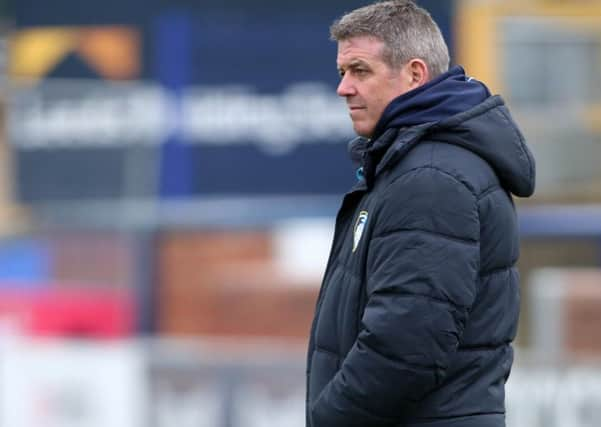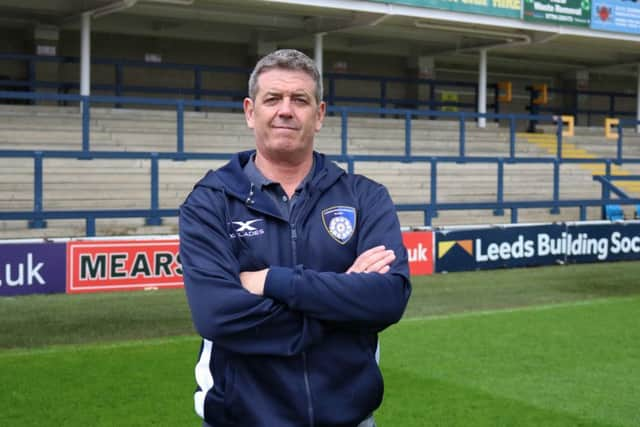Weekend Interview: Chris Stirling's bold aim to transform international perspective of Yorkshire Carnegie


It was certainly a hard sell.
“I was just about on my hands and knees with some players,” explained the New Zealander.
“‘Please, just please, come to Penzance and we’ll pay you… not much!’”
Advertisement
Hide AdAdvertisement
Hide Ad

Not long after, however, the unfashionable club was seen as a vibrant place to be, offering quality coaching, a side that reached two Championship finals and providing aspiring players with a potential pathway into the Premiership.
That experience is part of the reason 55 year-old Stirling has an unswerving belief that he can make Yorkshire Carnegie attractive once again.
It is 13 years since the club, when still Leeds Tykes, were able to lure his fellow countryman – All Blacks legend Justin Marshall – to the Broad Acres and played Heineken Cup rugby.
It seems a distant memory now. In fairness, scrum-half Marshall never lived up to all the hype but his ill-conceived signing was perhaps a sign of what was to come as the club began its downward spiral.
Advertisement
Hide AdAdvertisement
Hide AdThey have been in the Championship for the last seven years, bereft of the sort of financial muscle realistically required to not only secure promotion but then stay in the top tier, too.
However, Stirling, appointed as the club’s new director of rugby in April and now back in the UK given pre-season training started last week, is adamant he can not only recruit the right personnel to enhance their chances but also instil a club-wide culture that will lead to long-term prosperity.
“Rugby is a really small world,” he said.
“People talk, players talk, agents talk. If you can create that vibe, that buzz that something is happening up at Yorkshire Carnegie and it’s all positive talk instead of negative talk, all of a sudden people start queuing up wanting to come to your club.
“You’re then retaining the players you want to retain and attracting the ones you want to attract.
Advertisement
Hide AdAdvertisement
Hide Ad“I’ve got two successful club examples of where that’s happened. The Pirates was one but it was the same at the Hurricanes, too.”
Stirling was high performance manager at the Wellington-based club who won their maiden Super Rugby title two years ago and have transformed into one of the competition’s leading sides.
“The Hurricanes – and I’ve seen all the figures from when I was with New Zealand Rugby – produce about 40 per cent of New Zealand’s rugby talent,” he continued.
“Now, they’d never won anything. Never achieved anything.
“It’s because all their rugby programme was wrong.
“There was no common goal. There was no club culture. The environment was poor.
Advertisement
Hide AdAdvertisement
Hide Ad“Myself along with the help of the head coach (Chris Boyd) – who is now off to Northampton – really went about changing that and bringing in our eight provincial unions together all pushing towards the Hurricanes.
“They have consistently been at the top end in the last three years and will be, because of the systems they now have in place, for the next period as well.
“If they’re not making the semi-finals every year something’s gone wrong.
“In the end they were retaining the players they wanted to retain and attracting the ones they wanted to attract.
Advertisement
Hide AdAdvertisement
Hide Ad“Word spreads in rugby. With Carnegie, it will spread throughout the UK and beyond.
“At the moment, any New Zealand talent coming over wouldn’t consider Yorkshire Carnegie. In 18 months time they will.”
It is a bold assertion to make but Stirling is the sort of person who exudes confidence and he has the CV to help back it up.
Let’s not forget, he was, in essence, part of the all-dominant All Blacks set-up himself.
Advertisement
Hide AdAdvertisement
Hide Ad“My time with New Zealand Rugby really helped me,” conceded Stirling.
“In the respect of being in charge of talent identification and player development for the country, that was a real challenge. Monthly meetings with Steve Hanson were a real challenge!
“The systems and process that I helped to implement there which are still in place now are what I’m going to produce here.
“To be honest, the Academy are already doing most of them anyway. Obviously, the quality of player at Hurricanes was something else.
Advertisement
Hide AdAdvertisement
Hide Ad“But there’s no reason why we can’t replicate a lot of that gameplan here. We’ve just got to adapt that in certain areas.”
Stirling spent a few weeks on a fact-finding mission at Carnegie, studying the whole rugby set-up before making his recommendations to the board of directors regards his plans for eventually returning them to the elite.
He was generally encouraged by what he saw and said: “The academy is world-class.
“In our rugby programme there’s a couple of areas of world-class standard at the moment.
Advertisement
Hide AdAdvertisement
Hide Ad“One’s the academy and one’s our medical team. They are special. And I have worked with some pretty good medical teams around the world but these guys are really good.”
Now he links up with head coach James Lowes and forwards coach Steve Boden to help formalise that playing style for 2018-19, with the new season kicking off in September.
Carnegie finished sixth last term and realise hopes of immediately gaining promotion are unlikely; relegated London Irish are clear favourites and ambitious Ealing Trailfinders are also investing heavily.
But Stirling has moved to the other side of the world for the long haul.
Advertisement
Hide AdAdvertisement
Hide AdHe added: “The challenge and the opportunity attracted me most. I always wanted to come back. I always backed myself that I could coach in the Premiership and be a director of rugby.
“There wasn’t an opportunity with the Pirates. When I said to (owner) Dicky (Evans) in 2012 that I had to go back as nothing’s really happening here he offered for me to go back to New Zealand and still pay my salary!
“He said come back when I’m ready. I wasn’t going to do that – in hindsight I should have as it would have paid my mortgage off! – but I didn’t want to be locked into to something that possibly might not happen.
“Discussions (with Carnegie) probably started about June last year. Initial conversations surfaced and then the club basically reassured me they were really serious about it moving forward.
Advertisement
Hide AdAdvertisement
Hide Ad“It wasn’t going to happen overnight but everything was in place – or soon to be. The stadium, for instance, is just mind-boggling. Every time I go to Headingley and I think we’re going to be playing there...
“Outside of Twickenham, it is probably the best rugby ground in the country. That’s something to be proud of. It all felt right.”